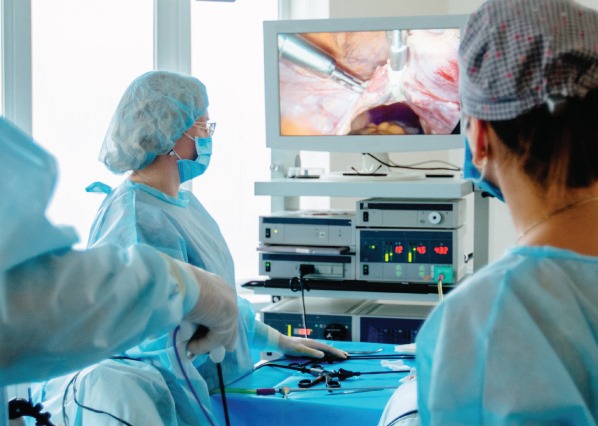Our Services
Endoscopy
Endoscopy is a revolutionary diagnostic and therapeutic tool that is used in reproductive medicine and specifically, In Vitro Fertilization (IVF) clinics.
Endoscopy involves the use of specialized instruments called endoscopes to view the internal parts of the body. Within reproductive health and IVF, the focus mainly lies on two types of endoscopy tools, laparoscopy and hysteroscopy. These tools enable specialists to observe, diagnose and occasionally treat fertility-related issues through tiny incisions or via the body’s natural openings.
Diagnostic Capabilities
Endoscopy serves as a critical diagnostic tool in IVF clinics. It helps in identifying issues that may not be evident through other diagnostic methods like ultrasounds or blood tests. Conditions such as endometriosis, uterine fibroids, polyps, pelvic adhesions, and tubal disease can be diagnosed with high accuracy. Identifying and understanding these conditions is vital for tailoring the appropriate fertility treatment.

Therapeutic Applications
Beyond diagnosis, endoscopy in IVF clinics can also have therapeutic benefits. Procedures such as the removal of fibroids, polyps, or endometrial lesions, and the correction of structural abnormalities can be performed. By addressing these issues, endoscopy can improve the chances of successful embryo implantation and pregnancy.
Minimally Invasive Nature
One of the significant advantages of endoscopy is its minimally invasive nature. Compared to traditional surgery, endoscopic procedures involve smaller incisions, leading to quicker recovery times, reduced pain, and lower risk of infections. This aspect is particularly beneficial in the context of fertility treatments, where patients often go through physically and emotionally taxing processes.
Endoscopic Procedures in IVF
Laparoscopy:
Laparoscopy is performed under general anaesthesia and involves inserting a laparoscope through a small incision in the abdomen. It’s used to view the outside of the uterus, ovaries, fallopian tubes, and surrounding pelvic area. Laparoscopy can diagnose conditions like endometriosis and can also be used for surgical treatments, such as removing scar tissue or repairing fallopian tubes.
Hysteroscopy:
Hysteroscopy involves the insertion of a hysteroscope through the vagina and cervix to examine the inside of the uterus. It is often used to investigate and treat abnormalities within the uterine cavity, such as fibroids or polyps, that could interfere with embryo implantation. Hysteroscopy can be performed under local or general anaesthesia, depending on the extent of the procedure.
Endoscopy has become an indispensable part of modern IVF clinics, offering both diagnostic and therapeutic capabilities. Its minimally invasive nature not only ensures a more comfortable experience for patients but also contributes to the overall success rates of fertility treatments. By providing detailed insights into a patient’s reproductive health, endoscopy allows fertility specialists to customize treatment plans effectively, thereby enhancing the prospects of achieving pregnancy. As technology advances, the role of endoscopy in reproductive medicine is set to become even more significant, offering hope to countless individuals and couples on their journey to parenthood.
